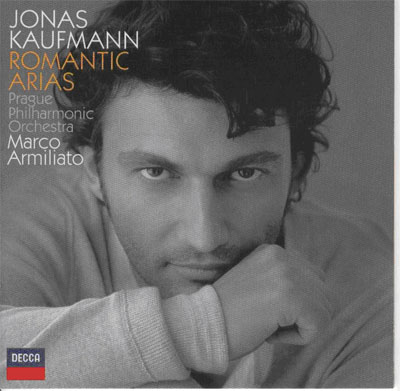
Jonas Kaufmann: Romantic Arias
Decca 4759966 (2008)

Once upon a time Decca was often the first to introduce a new exciting (Italian) tenor with a solo album: Gino Penno, Flaviano Labo, that marvel of Carlo Bergonzi’s first recital, Bruno Prevedi, James McCracken and Luciano Pavarotti. That was the time too the press department knew the spelling dangers of non-English arias and they would never have released a statement like the one accompanying this Jonas Kaufmann-first with 5 glaring mistakes spread over the three languages the singer uses. Decca is now mostly known (and abhorred) for its ridiculous policy of pretending a blind guy desperately clinging to the mike, is an operatic singer. Thus the firm is assuring that in 10-15 years their recent complete opera recordings will earn only scorn and ridicule and they will never be part of the back catalogue which is the most important asset for any company as future generations won’t believe their ears when they hear these miserable and strongly amplified snorts mixed with the voices of real singers. Still not everybody has lost his head to the marketeers as Decca introduced us to Joseph Calleja (lirico) and Juan Diego Florez (leggiero). But the company always had some powerhouse tenors too starting with Mario Del Monaco.
Enter Jonas Kaufmann. The Munich born tenor chose the royal way for his first album: a series of very popular arias which inevitably means he invites comparisons with his great predecessors: Bergonzi in Bohème, Don Carlo or Traviata; Tauber in Martha and Freischütz, Björling in Manon and Faust; Pavarotti in Rigoletto, Thill in Damnation etc. And no comparison is in Kaufmann’s advantage. The German tenor nevertheless has some assets. He always sings stylishly in the whole repertoire and he is at ease in all the languages. He knows how to phrase and to caress as his main weapon is a fine piano often descending or ascending in an agreeable pianissimo. Good examples are the difficult recitative to Traviata and the wonderful soft top note in Carmen. And another trump card is his strong top in certain arias. His high C in Bohème is the best German one since Wunderlich. On the other hand the same note in the Traviata cabaletta (two verses, many thanks) sounds laboured.
But then there is the fly in the ointment and that is the sound of the voice itself. No stylishness can hide the facts that the basic colour is impersonal and that he often sounds somewhat beefy and thick (though he is an improvement on Vickers). That absence of real richness is somewhat less obvious in the German arias where he makes a better impression than Botha’s in the same repertoire. But in French arias, notwithstanding a finely phrased Salut demeure ending in a refined pianissimo C, he sounds too heavy and unwieldy lacking the necessary elegance. In Italian arias he goes completely astray as no soft note, no firm line, no respect of note values can compensate for the warmth and sensuousness so necessary in these arias. Always there is some rounded but thick sound spoiling the effect of his good musicianship. I personally think he would do best to concentrate on German roles where his legato and good top make him the best (on record anyway) spinto since Konya though the Hungarian had a far more pleasing Italianate timbre. In short give me Mr. Kaufmann any day in the house, even in Italian and French roles, but on record Decca still has not found a real successor for Del Monaco, Bergonzi or young Domingo.
Jan Neckers, Operanostalgia